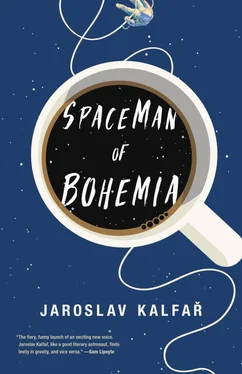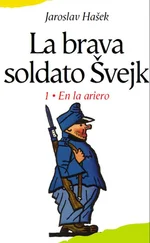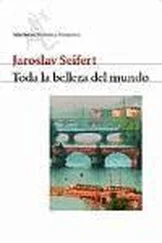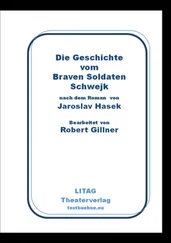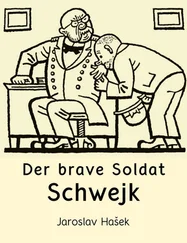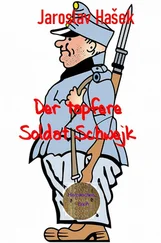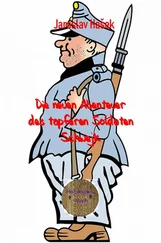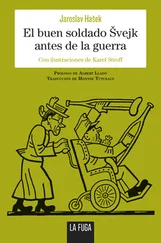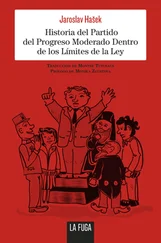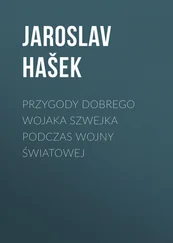She puts on her coat. Ten minutes later, she is back with a Milka bar in her hand. The label shows the picture of the purple Milka cow grazing in a pasture in front of the Alpine mountains. Mrs. Škopková apologizes again. The cable car collapsed, she says before she leaves. Your parents… The doorman glances at me over his crossword puzzle.
The driver picking me up is an old man who smells of pancakes. His hands shake as he drives. He makes the two-hour trip to Středa, turning the radio volume up when I ask what he knows about a cable car falling down a mountain in the Alps. My grandfather awaits us in front of the gate. He gives the old man money and takes my suitcase. In my hand, I hold an empty chocolate wrapper. Grandpa’s gray whiskers reach to his lips. The skin sinks deeply into his cheeks, and his eyes are barely open. Inside the house, Grandma drinks slivovitz and smokes cigarettes at the table. I have never seen her smoke before. Šíma sleeps underneath her legs, wags his tail lightly when he sees me, but then again closes his eyes and exhales shallow breaths, like he knows this is no time for pleasure. Grandma kisses me on the lips. I go to the couch and lie down and their voices reach me through the rhythm of that damned clock, always nagging, asserting itself harshly over the tranquility of smoke.
My grandparents take turns explaining. Earlier that morning, my parents boarded the cable car to get to the top of Mount Hoher Dachstein. I stare at the ceiling and remember my father’s enthusiastic lectures on the workings of cable cars. Aerial tramway ropes are made of dozens of individual steel strings with hemp running through the middle. I imagine my father’s lips moving behind the tram glass, re-explaining this to my mother as she admires the albino behemoths ahead, nearly lost in the morning mist. Somewhere down the line, a string pops. And another. And another. The tram is suspended in midair as Earth’s physics race to catch up. In my imagining of the event, influenced by watching Laurel and Hardy every night before the evening news, the car falls very slowly, and the bodies slide back and forth as they grab on to each other, until they are forced into a dying waltz, ladies and gentlemen locked arm in arm, exclaiming vintage expressions like “Oh dear” and “I never.” But this serenity of initial suspension—this antigravity waltz—is interrupted as the falling car gains speed. A gentleman accidentally touches a woman’s midriff, and she slaps him across the cheek with a leather glove. The car wobbles and its occupants hold on to each other’s ties and skirts, pulling off pants and wigs, the slapstick shenanigans of the silent film era. I’m not sure how these cast members die, whether their bones burst through their flesh, whether they die on impact, spines and skulls thrown over the sharp edges of black rock.
We occupy the living room, and Grandma sings a song I have not heard before about a young man leaving a hop farm to court a girl in the big city, winning her in the end by brewing miraculous beer made from hops his mother packed for the journey. Grandpa smokes, sucks from a warm bottle, coughs. Šíma whines for some food. I hold the Milka wrapper. Grandma speaks to me, but I cannot unseal my dry lips, cannot recall the sounds of our alphabet. I’m looking for my parents in all this snow. The ceiling cracks along the corners and a daddy longlegs crawls out.
Two days pass, and I move only to urinate in the chamber pot Grandma has left next to the couch. I hear Šíma lapping from it when nobody’s looking. Grandma tries to feed me, but I can’t open my mouth. She wets my lips with water. Grandpa rubs my feet and my hands with his callused fingers, stained yellow. I hold the Milka wrapper. When my grandparents go to sleep, they pull a blanket over me and Šíma snores at my feet, his whiskers wet with urine. This makes me love him more. Grandpa stays up late to watch football and all the American movies the privatized channels can now show. He knows I watch from the corner of my eye, a brief distraction from my search for the bodies, and I angle my head to get a better look at the man in a fedora who whispers to the beautiful blonde. The glow around her hair, her refusal to look the man in the eyes, gives it away—she has a secret. Their lip movements do not match the Czech words they speak. Neighbors come by every day to speak of condolences and God, but Grandma keeps them at the doorstep and thanks them quietly. He was such a good boy, they say of my father. They don’t say he was a good man. I hold the Milka wrapper and I imagine standing among these Austrian mountains as frost causes phlegm to drip from my nose and sting my upper lip. My fingers are black and dead. The world is too vast and there are so many places where humans perish quietly. What good am I, a thin purse of brittle bones and spoiling meat? I can’t find my parents. On the fourth day, I smell like the couch, a mix of dog, detergent, and spilled coffee. My calves cramp and my stomach feels disemboweled. Grandma wears a black dress and blush on her cheeks. Her lips will not cease trembling to the rhythm of her shiny cross earrings. She does not like God but she loves the cross. Grandpa stands over me in a black suit jacket and slacks, a shocking variation on his usual wardrobe of muddy overalls and old army jackets. He holds a plate filled with rotisserie chicken, bread, and butter.
“You need to get up and eat,” he says.
My eyes are with the ceiling cracks, and my fingers are outstretched, wishing to peel back the layers of plaster. My right leg cramps. I grit my teeth and ignore it.
“You don’t have to go to the funeral, but you have to eat,” he says.
“They found the bodies?” I ask.
“We never lost them. It took a while to get them here from Austria. I want you to think about whether you want to come with us. Nobody will be upset if you don’t.”
My search for the bodies was pointless, then. He grants me a few minutes of silence, then forces my mouth open and shoves a piece of chicken inside. He takes the Milka wrapper from my hand and throws it inside the cold chamber of the stove. I chew, and the salt and flesh feel so good they make my eyes water.
“You have to get up now,” Grandpa says. “You have to be a person.”
I resist, reject. The creature loses the thread of my life, and we return before Jan Hus. King Wenceslas no longer protects him—Hus has officially been declared a heretic by the church, a stigma as permanent as a birthmark. The Romans now consider Bohemia a nation of heretics. Hus wears a simple white robe and climbs atop a spotted, undernourished horse. Sigismund, king of the Romans and heir to the Bohemian crown, has promised Hus a safe passage and lodgings if he attends a council of church leaders to explain his betrayal. Does Hus sense treachery ahead? It is hard to tell, for his eyes are always set forward, as if he sees wonders beyond reality, as if he can penetrate dimensions and pick at concealed truths. Hus arrives at Konstanz and lives, unharmed, in the house of a widow. Her long, dark hair reaches to her knees and her shoulders sink from the disappointment of dead love. She never looks Hus in the eyes, yet speaks to him sternly, as if addressing a misbehaving little boy. She makes thin vegetable soup for him, and Jan soaks his bread crust in it, careful not to soil his beard. He tells the widow that no earthly group can provide true salvation. His faith will not be prescribed or dictated. The books he loves and hates will not be burned. His nation will not be blacklisted on account of greed. Against orders from his hosts, Hus preaches in Konstanz—his conviction is a compulsion not subject to self-preservation. The widow kisses him before he is imprisoned. The men condemning him set a sign on his head: Heresiarch . Leader of heretics.
Читать дальше
